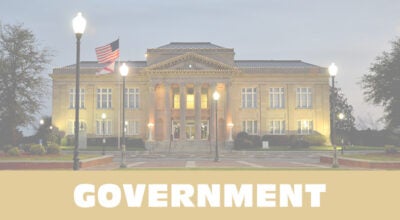District 3 candidates don’t agree on mileage compensation
Published 12:06 am Saturday, March 10, 2012
Harold Elmore is seeking a third commission term. He spent most of his life as a farmer.
Joe Bush is retired from the Department of Human Resources, but also has worked in the fields of accounting, banking and computer programming.
Q: Should the county remain on the unit system or return to the district system?
Elmore: You know I voted against the unit system for personal reasons. At the time, I thought that was the way to go. We had also in the meeting where we voted, I turned around at the end of the meeting and said I would work with the other commissioners to make the unit system work. That is what I had wanted to do, because I lost don’t mean I couldn’t work with the other commissioners because that was a majority. And I wanted us to try to work together. If we see down the road it don’t work, we’ll try something else, but we’re going to try to make it work. If it saves money, that’s the main thing. It’s hard to say that right now because there’s a lot a FEMA money we’re saving a lot of money in making trips when we put this stuff on the roads, this lime base we’re putting on the roads, is the best thing we ever done for the county. It’s not a permanent fix, but it’s temporary.
Bush: The county should remain on the unit system. There are issues there that need to be addressed by the commissioners. Basically, a lot of people feel they have no contact or influence with the commissioner or what is done with roads. The commission needs to be more attentive to needs of people and communicate that back to the engineer. And get back with citizens to let them know what’s going on.
Q: For many years, county commissioners had direct responsibility for the county-maintained roads in their districts. Now that the system for managing roads has changed, what do you see as the job of a commissioner?
Elmore: To me, as a commissioner, my job hasn’t changed. It’s the same thing when I was in the districts because I still represent my district, ride the roads, check the roads, call in work orders, put up flags, check 911 signs – and that is awfully important because if a 911 sign is torn down, the rescue squad hunting someone and can’t find them, they’re lost. I feel like the citizens want to see their commissioners out on the roads. They want to see him doing things, talking to people. I don’t think they elect us to stay up here in an office in Andalusia all day.
Bush: The first job of a commissioner has to be the budgeting process and overseeing the $21 million budget. Maintaining roads, paving roads and any improvements made in the county requires money. At this point, there is no perceived growth anytime in the near future. Management of funds is one of the most important things the county commission will have to do over the next four to eight years.
Commissioners also have the administrative responsibility of the county, including the county engineer and the county administrator, and those are two important responsibilities the commissioners have to be concerned with and addressed.
Q: Current commissioners have been criticized in this election for the mileage levels at which they have been compensated. Why are so many miles required, and how do you justify these? For non-incumbents, how do you plan to handle mileage if elected?
Elmore: It’s fairly easy to me to justify the mileage I ride the roads on because that’s part of my job. When we went to this unit system, I still do the same thing I done in the district. I get out and check the roads. The supervisor doesn’t have time to ride the roads. When I ride the roads, I find things that need to be addressed. I (identify the problem) and give it to the supervisor. I think it’s awfully important to ride the roads. I think that’s what people want. They want to see their commissioner out working. An elected official is at the disposal of the people. We serve the people. I want to be a hands-on person. I want someone to come see me, stop and talk to me. Tell me if they have a need. If you’re sitting at the house or sitting in Andalusia, you can’t see that need.
Bush: Basically, I have never been paid to travel to my workplace. If you decided to become a public servant as a county commissioner, it should be your responsibility to know where the meetings will be, how often they will be and to make arrangements to get to them without being reimbursed by county.
There have to be measures put into place that assure that the cost submitted by commissioners is reviewed prior to payment.
I do believe that with travel exceeding $31,000 over the past 12 months, I feel like significant reductions can be made in the amount of travel paid to commissioners. There are county employees who are currently working. They ride the roads. They see what’s going on. Commissioners could have the option of either riding with them or responding to a request from that employee to make a personal observation of any problems that are occurring. At that point, it’s the commissioner’s responsibility, as we said before, to get with the engineer to see problem is resolved
Q: One of the major tasks of the commission is to manage the county’s finances. What experience do you have in financial management? Can you read a financial statement?
Elmore: Yes, I can. As far as managing the county’s finances, I think I’m well qualified for that. I’ve farmed for 40 something years. I had a budget to live on and to work within. Sometimes when you’re row cropping, you lose money. I’ve had to go back to the bank and say I couldn’t pay back what I borrowed. Then, I had to go home that night and figure out how to recoup that money. I didn’t have a big corporation to help me. I was the one the bank was looking at. I manage the county money like it’s mine.
Bush: I have an undergraduate degree in accounting from the University of Alabama. I worked with the State of Alabama for 30 years, 27 of that in administrative and supervisory positions with the Department of Human Resources as a county director. Those responsibilities included hiring employees, managing mileage, assuring that local funds expended properly to meet needs of children and adults within the county.
I can read a financial statement. I currently have copy of the county budget and have reviewed that over the last two months. There are several issues of concern that the commission will have to address in the next few years, particularly concerning the issue of long-term debt. We will also have to make sure that we live within means we project to have in the next few years, which means we will have to plan for more than one year at a time. We need to have to have a plan for one, two, three, five years down the road as to what our expenditures and income could possibly be.
Q: What’s the biggest issue facing the county in the next four years?
Elmore: It’s still financing. The biggest issues is financing, keeping people working, looking at ways to bring revenue in, like out at the airport. One project that comes to mind is the (USDA) farm office, we’re going to remodel it, redo some stuff (and) put in new carpet. When we do that, we hope to raise the rent so we can get more revenue.
Bush: Simply, it’s the financial issues that come up. We have to plan on providing services the citizens expect without having any significant increase in revenue. We also have to address the issue of long-term debt; how it effects the county; and the amount of current income it takes to repay that long-term debt. Those payments have to be made, which takes money away from providing services to the people right now. Those issues have to be addressed. The vote and the next four years will set tone in the way county goes in planning its development and the use of its financial resources over the next few years.





